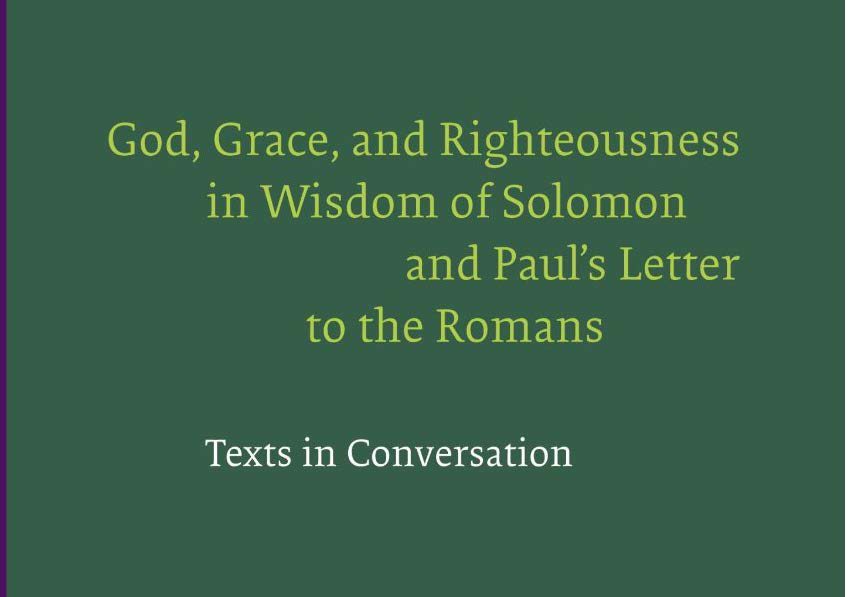In this volume, his revised 2011 doctoral thesis from Durham University under John M. G. Barclay, Jonathan Linebaugh seeks to place Romans and Wisdom of Solomon (henceforth Wisdom) in conversation with one another.
After setting out the trajectory of his thesis in the introduction, Linebaugh moves on to examine the developments (or lack thereof) in the recent scholarly discussions of Paul and Judaism. Linebaugh contends against the common notion that E.P. Sanders, with his Paul and Palestinian Judaism: A Comparison of Patterns of Religion1, occasioned a ‘paradigm shift’ in scholarship. Linebaugh suggests that both the pre- and post-Sanders schools fundamentally operate within the same paradigm. This is the case because, according to Linebaugh, they both use the same basic categories to evaluate Judaism, focusing mostly on questions regarding ‘the priority of grace, the causal or conditional function of obedience, the relative pessimism or optimism of an author’s anthropology and the presupposed tension between divine giving and human deserving’ (12). These categorical preoccupations in the post-Sanders paradigm result in that the ‘essential theological structures…are silenced rather than allowed to surface’ in the analysis of Jewish texts. Moreover, more often than not, scholars leave the hermeneutical question aside (12). A further problem with those contending for or against Sanders’ thesis is that both sides usually treat ‘Judaism’ as monolithic ‘meta-phenomenon’ (2), often treating an abstract notion of Judaism as more or less univocal throughout its various textual expressions. By way of contrast, Linebaugh sets forth to expound the theological grammar of one text in particular (Wisdom) and intends to put this one text in comparison with the theology of Romans.
Linebaugh notes that most comparisons between Wisdom and Romans identify that the theology of Wisdom and Romans are distinct, but they fail to answer the question of why each text concludes with a theology that is incommensurable with the other (13–20). He suggests that the question should be probed further than it has been, especially since both theologies are hermeneutically grounded in Israel’s scripture. What makes these two authors read the same texts in two different ways? The exception for Linebaugh is John M. G. Barclay’s article ‘Unnerving Grace: Approaching Romans 9–11 from The Wisdom of Solomon’2, in which Barclay provides an answer to this question. In this volume, Linebaugh seeks to vindicate Barclay’s thesis, namely that Wisdom’s theology comes from a reading of Israel’s history derived from a protological conception of ordered, symmetrical, and retributive justice, whereas Paul’s theology emerges from reading Israel’s history as a prefiguration of the unconditioned Christ-gift (19–20).
Linebaugh’s methodology is thus to first explain the content and logic of Wisdom’s ‘own essential theological structures and concerns’ (21). Then Linebaugh plans to consider important theological passages from Romans in order to place them in (hypothetical) conversation with Wisdom, in order to understand their theology with reference to the other (20–22).
Chapter two, ‘Reading the World Rationally from End to Beginning: Wisdom 1–6’ (27–42), focuses on how Wisdom shapes the contours of its own theology. Wisdom takes the Deuteronomic blessings for the righteous and curses for wicked and projects them into the eschaton (27), thereby interpreting the cosmos in a fundamentally symmetrical and orderly fashion, as a balanced world that reflects the retributive justice of God. Wisdom then retrojects the pattern of blessing and curse into the story of Exodus, such that it is not Israel qua Israel who is delivered from Egypt, but rather Israel qua the righteous. Accordingly, Pharaoh and his servants are condemned because they are unrighteous. Thus, in Linebaugh’s own words, ‘the symmetry and soteriological logic of this cosmological construal is shaped by a paradigmatic reading of the Exodus-pattern of salvation for the righteous and condemnation for the ungodly’ (27). This reading is occasioned by an empirical theological problem, namely that the author sees the righteous suffer and the unrighteous prosper (30–34). Wisdom’s solution to this problem is to postpone the ordering of God’s justice to eschaton, such that the revelation of God’s justice is found in the future event of vindicating the righteous and condemning the unrighteous (34–42).
In chapter three, ‘Wisdom’s Place in Wisdom’s Theology: 6.1–10.21’ (43–60), Linebaugh argues that wisdom (σοφία), as the ‘theological architect’ (44) of Wisdom’s theology, plays a more central role in the book’s soteriology than has been realized by past interpreters. Wisdom reveals herself as the instructing principle who saves those who seek her and follow her ways, creating an inherent ‘connection between salvation and education’ (48). The activity of wisdom in saving those who rationally seek her corresponds to the canons of justice she set up in the beginning (49). The result is the ‘leitmotif’ that ‘wisdom rescues from trouble those who care for her’ (Wisdom 10.9) (55). So, as wisdom is the protological agent who establishes the justice of the cosmos, she is also the agent who gives salvation to those who deserve it, thus upholding that creational justice.
In chapter four, ‘Tradition and the Individual “Talent”: History and the Divine Economy in Wisdom 10.15–19.22’ (61–80), Linebaugh examines the ‘two extended reflections’ on divine beneficence and justice (Wisdom 11.15–12.27; 13.1–15.19) (63–69). The first of these reflections concludes that mercy is given only to its fitting recipients, those who are righteous. The second reflection explains the folly of idolatry, linking it with unintelligence and a failure to engage rational capacities (that which characterizes the Egyptians for the author of Wisdom). This is contrasted with Israel to whom is given appropriate knowledge to rightly reject idolatrous practices. Linebaugh then goes on to explain how Wisdom applies these conceptions to the Exodus (69–80). Wisdom reads the plagues of Egypt in diptychs, interpreting each judgment for the Egyptians along with a corresponding gift for Israel, vindicating the justice of the God who congruously rewards the righteous and condemns the wicked. Linebaugh points out that the incident of the golden calf is conspicuously absent from Wisdom’s retelling of the Exodus, as it may be a rather unforgiving terrain for the author’s theological program.
Chapter five, ‘A Rational Reading, in Retrospect’ (81–89), summarizes the findings in Wisdom’s theology thus far, and unites three themes that have come to surface: the just distinction between Jew and gentile as recipients of divine favor and hatred (respectively), the fittingness of God’s gifts and judgments as responses congruous with the worth of their recipients, and the protological conception of justice that shapes a reading of the Exodus as the vindication of the righteous over against the unrighteous.
Chapter six, ‘Announcing the Human: Israel Against and as the Ungodly in Wisdom 13–15 and Romans 1.18–2.11’ (93–121), compares the content of and warrant for the distinctive anthropological analyses in each text. Despite some immediate similarities between Wisdom 13–15 and Romans 1.18–2.11, Linebaugh contends that they serve opposite argumentative purposes. Wisdom 13–15 sets forth an exposition of an idolatry in order to make a distinction between the Egyptians as the unrighteous and Israel as the righteous. Paul, however, provides an exposition of (initially gentile) unrighteousness (Rom 1.19–32) only immediately to turn such polemics against Jews as well (Rom 2.1–11). Thus, instead of Wisdom’s bipartite analysis of theological anthropology, Paul finds an ‘anthropological universalism that reduces the Jew/Gentile distinction to a single denominator: homo peccator’ (115).
Chapter seven, ‘Soteriological Semantics: Righteousness and Grace in Wisdom and Romans’ (123–176), provides a reading of Romans 2–4 and Wisdom in relation to the key theological terminology of righteousness (δικαιοσύνη) and grace (χάρις). Romans 2.6–13 follows the logic of Wisdom in creating symmetrical eschatological destinies for the righteous and unrighteous (Rom 2.13). However, Paul’s anthropology alters the fundamental situation of these dual destinies: because ‘No one is righteous’ (Rom 3.10) there is now nobody in the category of the ‘doers of the law’ (Rom 2.13), and thus all are condemned. ‘This does not disqualify the principle of correspondence,’ Linebaugh suggests, ‘but it does radically and dangerously destabilise it’ (132). Thus in Romans 3.21–26, ‘another kind of righteousness’ (133) is revealed that enacts both ‘the justification of God and the godless’ (135). Wisdom correlates the χάρις of God as proportionate and congruous to its recipients, thus upholding the δικαιοσύνη of God according to its protological conception. In antipathy to Wisdom, Paul’s δικαιοσύνη of God is defined by the Christ-event in which he gives χάρις to those who are unworthy.
Chapter eight, ‘With the Grain of the Universe: History and Hermeneutics in Wisdom 10–19 and Romans 9–11’ (178–226), seeks to show how Paul’s location of the righteousness of God in the Christ-event affects the way he reads Israel’s scriptures. This is to be set in contrast to the hermeneutic of Wisdom, namely the protological definition of retributive justice. Wisdom retrojects its reading of the Exodus onto the patriarchs of Genesis, and, in the midst of Genesis’ varied silence regarding the election of the patriarchs, holds that divine election is fitting to those who are already righteous. By contrast, Paul exploits the silences to argue that no human criteria of value conditioned God’s election of some patriarchs over the others. Paul ultimately describes the fact of divine election and refuses to provide explanation (Rom 9.15) (177–194). Linebaugh argues that Paul has thus read Israel’s history through God’s action in Christ, in which righteousness plays no role in God’s justifying act. Linebaugh then suggests that in Romans 9.30–10.21, the nature of Israel’s election is revealed in their acceptance or rejection of the proclamation of Christ (194–207). Moving on to Romans 11, Linebaugh pushes back against any non-christological soteriology present in Romans 11. Paul’s hope for Israel is definitively ‘Christ-shaped’ (207), and Linebaugh seeks to explain the chapter in such terms (207–226). Paul envisages Israel’s rejection and future salvation in a way that parallels theologically and verbally the death and resurrection of Jesus Christ (218). Reflecting on the differences between the two authors once again, Linebaugh emphasizes that Wisdom reads Israel’s past narratives in Genesis-Exodus as affirmations of symmetrical justice, having a hermeneutic conditioned by a conception of cosmological structure of judicial symmetry. Paul, reading scripture in the aftermath of the Christ-event, sees God’s workings in the past present and future as echoes of the disjunctive, incongruous, and sub contrario divine workings.
This volume is certainly to be commended for its sophistication in many areas. Linebaugh’s introduction contributes significantly to the methodological discussions in comparisons between Paul and ‘Judaism.’ Past works, both favorable and unfavorable to the Sanders paradigm, have often (though certainly not unanimously) attempted to treat Judaism as a monolithic ‘meta-phenomenon’ by synthesize the theology of multiple texts. Sanders’ Paul and Palestinian Judaism utilized this method in an attempt to show that ‘Judaism’ as expressed in the Second Temple through Rabbinic periods all adhered to a basic ‘covenantal nomism’ (2). This may be true, but his definition of covenantal nomism fundamentally reduces the differences between the individual Jewish texts. Sanders, as he tried to show the threads of continuity between Jewish texts regarding the relationship between divine beneficence and human worth, ultimately silenced the Jewish texts rather than creating a space for each of their unique voices to be heard (which, we may add, is ironically what he was attempting to stop).
The methodology exhibited both in Sanders and e.g. Gathercole’s monograph Where is Boasting?3, despite the fact that they may be placed within two different ‘camps’ or ‘paradigms’, ultimately forces them to ignore the theological logic of individual texts, along with their particular concerns, structure, and arguments. Hence Linebaugh seems justified in suggesting that, since Sanders still approached the Jewish texts with a theological bias, Paul and Palestinian Judaism did not bring about the paradigm shift of which it is so often credited. Linebaugh’s methodology of comparing the theology of two authors through each of their individual texts must be the way forward in future works comparing Paul and his contemporaries. Analyzing individual texts in order to juxtapose them allows the texts to speak for themselves, and Linebaugh’s monograph comparing Wisdom and Romans individually has shown the potential fruitfulness of the methodology he sets forth.
One important contribution to Pauline studies in particular is Linebaugh’s insistence that the meaning of ‘grace’ is not univocal throughout various Jewish texts (Romans and Wisdom being the key examples, of course). Without presupposing a definition of ‘grace’, texts that speak of grace such as Wisdom (and others, especially Philo), are able to be heard in their own right. Presupposing that grace cannot mean a gift given only to the worthy is a (Pauline) theological presupposition that, if imposed onto all other grace-texts, will end possible investigation before it begins. Linebaugh’s methodological objectivity in regard to this issue is to be admired.
Linebaugh’s identification of Paul’s constant christological particularism – that is, that all of Paul’s ‘doctrines’ (so to speak) are constituted and circumscribed by the person-event of Jesus Christ – is impressive and exegetically significant. Linebaugh advocates for christological particularism in multiple places: the ‘grace’ of God is Jesus Christ, ‘the gospel’ the crucified and risen Jesus Christ, and, maybe most radically, Linebaugh specifically defines ‘the righteousness of God’ as the gospel itself (136f.; 176). This evaluation is not given because christological particularism is presupposed as a better exegetical method or theological construct, but rather because Paul himself begins all of his theology at the Christ-event and from there moves outward. In more generic terms, Linebaugh’s exegesis constantly emphasizes that Paul moves from particular to universal (the Christ-event to righteousness, grace, etc.), whereas Wisdom’s theology moves from universal to particular (protological, abstracted justice to Israel’s history). Linebaugh shows that Paul himself rarely (if ever) writes any theology in abstraction from the Christ-event. Linebaugh’s exegesis is to be contrasted with other commentators on Romans, both historical and contemporary, who treat doctrines such as justification by faith as more or less abstractions in Paul’s theology, such that even the Christ-event becomes a mere expression of a universal divine relationality. Linebaugh’s work pushes scholarship to consider Paul’s theology as more (christologically) particularist than has previously been imagined. In future works on Romans exegetes should reckon with this construction.
In this same vein Linebaugh’s emphasis on connecting Paul’s christological theology to hermeneutics is a unique move, one not evinced in many works on Romans. Though the exegesis of Romans 11 in particular may seem strained to some, Linebaugh provides the best case that can be made to prove that Paul’s hope for the future salvation of Israel is constituted by the Christ-event itself. The resulting reading as described above is truly and radically unique.
Despite the high level of sophistication in this volume, a rather important exegetical issue in Linebaugh’s work must be noted: in his emphasis on Paul’s conception of grace as incongruous to the worth of its recipient, Linebaugh does not include Paul’s notion of final judgment as relevant to this aspect of his theology. The one text in Romans that clearly speaks of final judgment in judicial terms is Romans 2.12–13, and Linebaugh’s exegesis of this verse seems to stand on shaky ground. As noted above, Linebaugh juxtaposes Romans 2.13, ‘The doers of the Law will be justified’ with Romans 3.10 and 3.20, ‘No one is righteous’ and ‘From works of the Law no flesh will be justified before him’, respectively. The result of these three texts is that, according to Linebaugh, the principle of correspondence is ‘radically and dangerously destabilise[d]’ (132). However, the ensuing explanation concerning why this inherently destabilizes retributive justice is found wanting in argumentation (132–133). If Paul simply allowed ‘all flesh’ to be condemned as unrighteous, this may certainly sound unfortunate, but Linebaugh fails to provide reason for why this internally effects the principle of correspondence per se.
This is not simply to note a particular exegetical move with which I disagree. Much of Linebaugh’s thesis rests on this one exegetical decision, since connecting Romans 2.13 with 3.10, 20 instead of the immediately following text (!) of 2.14–17 allows him to read Paul as rejecting the reality of a (final?) justification that corresponds with the righteousness of the individual. Connecting Romans 2.13 with Romans 3.10, 20 is a significant move as it brackets out Paul’s own juxtaposition of ‘the doers of the law will be justified’ with an example of this justification in 2.14–17 (‘for when gentiles…’). In an extended footnote Linebaugh (130n18) argues that those described in Romans 2.14–17 are used purely as a rhetorical fiction: the righteous gentiles described in 2.14–17 do not actually exist, since this is ‘the very possibility Paul declares impossible outside of Christ in 3.20’ (130n18). But why does the description of (Christian) gentiles who obey the Law necessitate that this a reality that exists outside of the Christ-event? Later in Romans Paul will figure the Christ-event as the cause and grounds of obedience to the Law (8.1–4). In light of this, there is no reason to suppose that the Law-obedience described in 2.14–17 must be considered antithetical to or outside of the Christ-event.
By bracketing out this principle of correspondence Linebaugh is able to avoid discussing congruity in Paul’s configuration of eschatological judgment, a doctrine present in Romans itself (e.g. Rom 8.13; cf. Gal 6.8). With this, Linebaugh bypasses the need to explain the relationship between initial incongruity and final congruity. Linebaugh consistently argues that Wisdom’s congruous eschatological judgment must be contrasted with Paul’s incongruous justification in the (eschatological) present, but a lacuna is created in Linebaugh’s reconstruction when he ignores congruous final judgement texts in the Pauline corpus.
This volume is impressive in its theological attentiveness, exegetical rigor, and methodological sophistication. I count it as one of the best works on Romans to date. Despite any exegetical disagreement, this volume is an important landmark for future explorations in the exegesis of Romans and, more generally, the relationship between Paul and Judaism.
Reviewed by Logan Williams, University of St Andrews.
Notes
[1] (Minneapolis: Fortress, 1977).
[2] In Between Gospel and Election (WUNT 257; ed. F. Wilk and J. R. Wagner; Tübingen: Mohr Siebeck, 2010): 91–102.
[3] (Grand Rapids: Eerdmans, 2002).





2 Comments
Leave your reply.